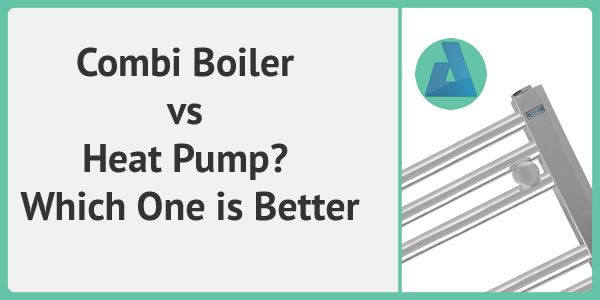Boiler technology has evolved significantly, particularly with the options of combi boilers and heat pumps. As you navigate the complexities of heating your home, understanding the benefits and drawbacks of each system will empower you to make an informed decision. This guide will explore their operational principles, efficiency, and suitability for various scenarios, allowing you to weigh the advantages of each heating solution as you strive for optimal comfort and energy efficiency in your living space.
Understanding the Types
Your understanding of the types of heating systems is imperative in making an informed choice between a combi boiler and a heat pump. Each has its distinct characteristics and operational principles that cater to various heating and hot water needs. Below is a breakdown of the two systems:
| System Type | Description |
|---|---|
| Combi Boiler | Combines heating and hot water in one unit, highly efficient for small to medium homes. |
| Heat Pump | Utilizes renewable energy by extracting heat from the air or ground, ideal for larger homes. |
Before making any decision between these two systems, you must consider your household size, energy efficiency needs, and usage patterns.
Combi Boilers
Some of the core aspects of combi boilers are their straightforward design and function. They heat water on demand, which allows you to benefit from instant hot water without the need for bulky water tanks. Consequently, they are often preferred for smaller homes or apartments where space is at a premium. The convenience they offer, combined with their relatively quick installation process, makes them a popular choice among homeowners looking for efficient solutions.
Moreover, combi boilers tend to operate at high efficiency, especially during cooler months. This means that your energy bills can be controlled effectively, provided your hot water demand is not excessive. However, understanding any limitations—such as output capacity during peak times—is imperative to ensure they meet your requirements.
Heat Pumps
Assuming you wish to embrace a more sustainable heating solution, heat pumps present an innovative approach. By harnessing ambient heat from either the air or the ground, these systems offer a renewable option that is increasingly lauded for its environmental benefits. Although the installation process is typically more complex and may require space for external units, these systems can provide significant energy savings over time, particularly in newer, well-insulated homes.
Above all, heat pumps can revolutionize your home’s energy efficiency, particularly when combined with smart technology. They can be integrated into existing heating systems and adjusted to optimize performance according to your home's specific heating demands. The adaptability and efficiency they provide can play a pivotal role in reducing your carbon footprint while ensuring comfortable living conditions throughout the year.
Key Factors to Consider
There's a multitude of elements to weigh when deciding between a combi boiler and a heat pump for your heating needs. Each system has its unique advantages and disadvantages, making it vital to assess what aligns best with your lifestyle and energy requirements. Some of the key factors to consider include:
- Energy Efficiency
- Initial and Ongoing Costs
- Space Requirements
- Environmental Impact
- Maintenance Needs
This holistic approach will facilitate a well-informed decision that harmonizes with your specific circumstances.
Efficiency
Consider the efficiency of the heating systems as they play a pivotal role in long-term savings and environmental impact. Combi boilers traditionally boast a high energy efficiency rating, operating on natural gas or electricity to provide both heating and hot water on demand. In contrast, heat pumps leverage renewable energy from the ground or air, often achieving even greater overall efficiencies by transferring heat instead of generating it directly. You may find that the efficiency of each system varies significantly based on your location and the existing infrastructure within your home.
Furthermore, the climate where you reside can dramatically affect the performance of heat pumps, as their efficiency tends to diminish in colder temperatures. Consequently, you should assess whether your local climate conditions adequately support the maximum efficiency of the heat pump technology. This understanding enables you to make an informed choice based on the expected performance of each heating system in your specific environment.
Cost
To evaluate the financial implications of both options, consider the initial installation costs and the ongoing maintenance expenses associated with each system. Combi boilers generally have lower upfront installation costs, while heat pumps typically require a larger initial investment due to the complexity of their installation and components. However, the operational costs of a heat pump may be lower in the long run due to their energy-efficient design and the use of renewable energy sources.
This cost-benefit analysis should take into account local energy prices, potential government incentives for renewable energy installations, and your long-term plans for your home. Indeed, while the upfront costs of a heat pump may be daunting, the potential savings from lower energy bills and a reduced carbon footprint can make it an economically sound choice over time. Additionally, evaluating the lifespan and durability of each system can also influence your overall expenditure and environmental impact.
Pros and Cons
The pros and cons of combi boilers and heat pumps are necessary considerations that will guide you in making an informed decision about the best heating solution for your home. Each option has its unique advantages and limitations, and understanding these factors will help you weigh your choices effectively.
| Pros | Cons |
|---|---|
| Space-efficient design | Limited hot water supply during peak demand |
| Instant hot water | Dependent on mains water pressure |
| Lower installation costs | Less efficient in colder climates |
| Easy to use | Requires regular maintenance |
| Durable and reliable | Higher operational costs over time |
| Quick heating of spaces | Poor environmental impact |
| Versatile fuel options | Incompatibility with underfloor heating systems |
| Simple controls | Can be noisier than heat pumps |
| No need for hot water storage | Limited customisation of heat settings |
| Well-established technology | Shorter lifespan than heat pumps |
Advantages of Combi Boilers
Pros include their compact nature and instant hot water delivery, making them an efficient choice for homes with limited space. You benefit from the straightforward installation and can enjoy lower initial costs compared to other heating systems.
Moreover, combi boilers offer reliability and ease of use, which is particularly appealing if you seek a hassle-free heating experience. You can attain rapid heating without the need for bulky water tanks, optimizing your living space further.
Advantages of Heat Pumps
Clearly, heat pumps stand out for their energy efficiency, often providing significantly lower running costs over time. They harness renewable energy sources, making them a more environmentally friendly choice for your heating needs.
Additionally, heat pumps offer the advantage of cooling capabilities in warmer months, rendering them a versatile solution for climate control in your home. By utilizing the ambient air or ground, they reduce your carbon footprint, contributing to a sustainable future.
A notable advantage of heat pumps is their long lifespan, often reaching up to 20 years or more with proper maintenance. This longevity can translate to a considerable return on investment, giving you peace of mind as you enjoy a consistent supply of heating and cooling.
Disadvantages of Combi Boilers
On the downside, combi boilers may struggle to provide sufficient hot water during peak demand times, potentially leaving you waiting when you need it most. You also face issues related to mains water pressure, which might hamper their efficient operation.
Additionally, these systems can have higher operational costs over time. Although the initial installation may be less expensive, you may end up paying more for energy as your heating consumption increases.
With the need for regular maintenance, you must be prepared for potential repair costs, which can arise as the boiler ages. The limited output capacity may not suffice for larger households, leading to potential conflicts over how to allocate hot water resources effectively.
Disadvantages of Heat Pumps
Combi boilers can be less effective in colder climates because their efficiency diminishes as temperatures drop, possibly impacting their ability to provide adequate heating. They may also demand a higher upfront investment, which can deter some homeowners from choosing them.
Furthermore, the installation process can be more complex than that of combi boilers, requiring specialized knowledge, which can lead to additional costs. You might also find that the noise generated by some heat pump units can be bothersome, detracting from your comfort at home.
Advantages of heat pumps include their minimal environmental impact, making them a compelling option if you prioritize sustainability. However, regional climate considerations should also inform your decision, as their effectiveness can vary based on external temperature conditions.
Step-by-Step Comparison
Now, when contemplating the best heating solution for your home, it’s necessary to analyze both the combi boiler and heat pump systems with precision. Here’s a detailed comparison to help clarify the strengths and weaknesses of each option.
| Factor | Combi Boiler | Heat Pump |
|---|---|---|
| Installation Time | Typically quicker, often completed in a day. | Varies, can take several days due to ground or air system setup. |
| Installation Complexity | Moderately simple, reliant on existing boiler systems. | More complex, usually requiring extensive piping or ground works. |
| Cost of Installation | Lower initial costs for setup and materials. | Higher up-front costs, balanced by long-term savings. |
| Energy Efficiency | Good, but limited by gas supply and combustion rates. | Higher, especially in moderate climates; uses renewable energy. |
| Running Costs | Cost-effective but dependent on gas prices. | Generally lower due to renewable energy reliance. |
Installation Process
You will find that the installation process for a combi boiler is typically more straightforward. If you already have the necessary plumbing in place, your technician can often complete the installation in a single day. On the other hand, the heat pump installation may take longer due to its complexity. Depending on whether you choose an air-source or a ground-source heat pump, your project could involve extensive excavation work or careful positioning of outdoor units, which may require professional assessment of your property.
Furthermore, regulatory considerations can also influence the installation process. Combi boilers often require minimal permissions, whereas heat pumps might need compliance with specific energy codes or local incentives, depending on your region. You should consult with your installer to understand better the nuances each system entails and ensure all safety and efficiency standards are met during installation.
Maintenance Requirements
The maintenance needs of both combi boilers and heat pumps are necessary factors to consider for their long-term sustainability and efficiency. In general, combi boilers require annual servicing to ensure optimal performance and safety. Regular checks for leaks, carbon monoxide emissions, and overall system efficiency are vital to prevent future problems. In contrast, heat pumps have a different maintenance rhythm; you may need to clean the filters and check the coolant levels periodically but benefit from fewer issues related to combustion.
Requirements for maintenance also differ significantly between the two. While a combi boiler's reliance on gas necessitates rigorous checks for safety, heat pumps benefit from a less intrusive maintenance schedule. You will find that keeping the coils clean and ensuring the electrical components are in good working order is sufficient for a functional heat pump system. Regular upkeep can lead to higher efficiency levels in both systems, prolonging their lifespan while contributing to energy conservation.
Tips for Choosing the Right System
Unlike simpler heating setups, selecting between a combi boiler and a heat pump necessitates a thoughtful approach tailored to your specific circumstances. Evaluate important factors such as your property size, insulation quality, and budgetary constraints. Here are some tips to assist you in making a well-informed choice:
- Consider the efficiency ratings of both systems.
- Evaluate your household's hot water requirements.
- Think about the initial installation costs versus long-term savings.
- Assess your region’s climate and energy sources.
- Investigate any available government incentives or rebates.
Perceiving the nature of your home's needs alongside potential energy costs is imperative for making the right decision in your heating journey.
Assessing Your Home's Needs
Homes vary in age, construction style, and insulation levels, which dictate the effectiveness of different heating systems. Begin by analyzing your property layout and hot water demands. If you experience frequent cold spots or inconsistent heating, a heat pump may provide a more balanced solution. Conversely, if you live in a smaller dwelling with lower hot water needs, a combi boiler might be the ideal fit.
Additionally, consider how many rooms require heating and whether your existing radiators including vertical radiators and bathroom towel rails can adequately accommodate the output from a heat pump. Generally, if your home is well-insulated, a heat pump will function efficiently. On the other hand, older or poorly insulated properties may benefit more from the instantaneous and high-temperature heating offered by a combi boiler, making it crucial to align your choice with the particulars of your living environment.
Consulting with Experts
Your decision-making process can be significantly enhanced by consulting with heating professionals and energy specialists. Engaging an expert allows you to explore the intricacies of compliant heating systems that serve your unique needs. They can conduct detailed energy assessments of your home to suggest the most suitable options, helping you navigate any complexities that may arise during the selection process.
It would be prudent to seek out channels in your community or online that offer reviews of local professionals. This allows you to gauge the expertise available and the specific services they provide, which ultimately shapes your heating infrastructure. The insights gained from these consultations will be invaluable, as they can help you balance the technical aspects of each system and get the best return on your investment.
Conclusion
To wrap up, the decision between a combi boiler and a heat pump often hinges on your specific needs and circumstances. Combi boilers tend to deliver rapid hot water and heating, making them a steadfast choice for homes with immediate hot water requirements. If your living environment emphasizes energy efficiency and sustainability, a heat pump might align more closely with your values as it harnesses renewable energy sources, thus reducing your carbon footprint. You must consider factors like your location, energy costs, and your home's heating demands, which will ultimately guide you in determining which system is superior for your situation.
Furthermore, as you explore these options, reflect on the long-term benefits both approaches offer. While initial installation costs can vary significantly, the implications for energy consumption and overall environmental impact are equally significant. By weighing these elements in conjunction with your lifestyle requirements, you enhance your ability to make an informed decision that caters to not just your immediate comfort, but also your future sustainability goals. Embrace this opportunity to contribute to a more sustainable future while ensuring your home remains a haven of warmth and comfort.


